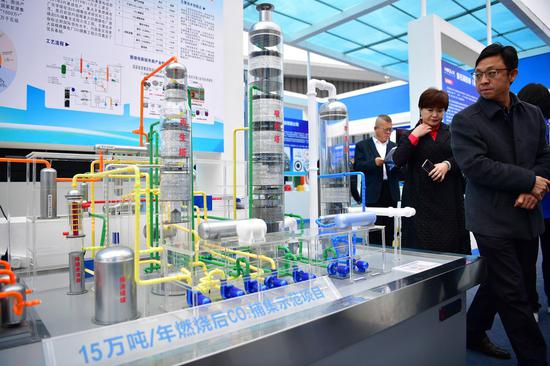China's sci-tech breakthroughs boost low-carbon chemical industry

Visitors watch the model of a demonstration project for carbon dioxide capture, in an energy and chemical industry expo held in Yulin, northwest China's Shaanxi Province, Oct. 13, 2021. (Xinhua/Shao Rui)
Having set the goal of peaking its carbon dioxide emissions before 2030 and achieving carbon neutrality before 2060, China is now promoting energy conservation and emission reductions in various industrial sectors, including the traditional chemical industry.
The Ministry of Industry and Information Technology (MIIT) released a plan on Dec. 3 for the green development of its industrial sectors during the 14th Five-Year Plan period (2021-2025), a step forward in the country's pursuit of low-carbon growth.
The plan urges traditional sectors, such as petrochemistry, iron and steel, and non-ferrous metals, to carry out low-carbon upgrades and transform into greener industries.
Meanwhile, the annual Central Economic Work Conference this December pledged to strengthen the clean and efficient use of coal.
So far as the chemical industry as concerned, greener practices are getting a boost from the latest breakthroughs in chemical synthesis technology. This means that sub-industries such as fuel chemicals, inorganic chemicals and organic chemicals are becoming more environmentally friendly, with knock-on benefits across a wide range of sectors.
SCI-TECH BREAKTHROUGH
In 2021, Chinese researchers achieved several breakthroughs in chemical synthesis. These include a method of synthesizing starch from carbon dioxide, the first process of its kind globally, and a protein production method using industrial exhaust gas that contains carbon monoxide, carbon dioxide and ammonia water.
The progress in 2021 also includes converting carbon dioxide and water into pure formic acid, turning biopolyols into carbon monoxide at room temperature and atmospheric pressure, and producing ethylene by hydrogenation of acetylene under mild conditions.
At a ceremony in Beijing in November to honor China's distinguished scientists, engineers and research achievements, over 10 projects related to the petrochemical and coal chemical industries received awards. They included catalytic-cracking processing technology, the efficient exploitation of coalbed methane and rock oil, and crude-oil recovery.
Among them, the project of nano-confined catalysis won first prize in the State Natural Science Awards. This project realized the direct and efficient synthesis of light olefins and high-value chemicals such as ethylene, propylene and butene from coal-synthesized gas, with less water and energy consumption and lower carbon emissions.
Those achievements, ranging from laboratory experiment to industrial production, mean that basic materials for the chemical industry, such as ethylene, carbon monoxide, starch and protein, can be produced in a much greener way than traditional methods and with lower energy consumption and emissions.
